RISE Abstracts due February 20, 2020
At RISE, 2000+ industry leaders, entrepreneurs, investors, researchers and technology enthusiasts from diverse sectors engage more than 400 of Northeastern’s solution-focused innovations. Over 100 esteemed judges from a host of industries (clean energy, computer science, engineering, life science, and finance, for example) come together to measure the ingenuity of Northeastern research and determine the recipients of the prestigious RISE Awards.
This year’s RISE will be held on April 9, 2020. Abstracts are due February 20, 2020. Showcase your innovative project at the RISE Expo!
LEARN MORE
How to Start a New Life When the Dream of Baseball Ends
More than 60 current or former professional ballplayers have enrolled in Northeastern-MLB partnership including Jarrod Saltalamacchia, the catcher of the 2013 World Series champion Boston Red Sox.
The Subtleties of Cymbals
Alumnus Paul Francis brings new sounds to an ancient craft
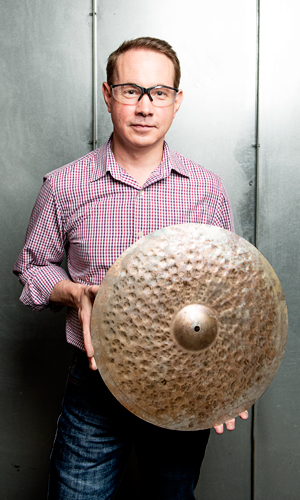
Francis, holding an unfinished K Constantinople cymbal, which is part of a series of cymbals that he designed with Armand Zildjian.
Crashes that cut like glass. A nice bright ping on the ride. For the uninitiated, such phrases might sound nonsensical. For Paul Francis (CPS ’07), they are terms of art.
“We get teased quite a bit that when we describe cymbals, it’s like we’re describing wine,” says Director of Cymbal Innovation Paul Francis, at the legendary cymbal maker Avedis Zildjian Company in Norwell, Mass. “We want to be sure that it’s balanced, that it has a full body. It could be dark, it could be bright. You want pure tones. You don’t want out-of-phase frequencies. When drummers talk to us, we know exactly what they’re saying.”
Francis began his own training as a drummer at 10 years old. Though he wasn’t able to afford a professional kit until years later, he was always attuned to the sound of cymbals.
“If you were to look at some of the pictures from high school,” he says, “my cymbals would cost more than the rest of the drum set. The cymbals really color the drum set. It’s the accents. It’s the exclamation points. I always had professional-series cymbals.”
After his graduation from Quincy High in 1986, Francis dreamed of fame and fortune as a professional musician. He studied briefly at Berklee College of Music, earned a certificate in drumming at New York City’s Drummers Collective, and then headed back to Boston, where he moved home and began to confront the stark realities of trying to earn a living as a gigging drummer.
His parents were supportive, but also practical, and they insisted that he find a day job. He landed an interview at Zildjian through his drumming teacher in 1989 and soon shoehorned his way into an entry-level position that had him sweeping the factory floor and hanging Christmas decorations in the front office lobby.
For a young drummer, Francis says, working at Zildjian was “much like being Charlie in Willy Wonka’s candy factory.” His enthusiasm and hard work impressed the bosses, and within a month he had begun to train as a lathe operator, using carbide cutting tools to shave material from each cast-metal discus until it reached the target weight for the cymbal it would become. For the next seven years, he honed his skill at lathing, the most difficult process in cymbal making, and in 1995 he was promoted to research and development technician, developing new cymbals for artists and the marketplace.
Making great cymbals, Francis says, is as much art as science. At Zildjian it started as a form of magic. According to the company’s website, Avedis Zildjian was “an Armenian alchemist in the city of Constantinople in the early 17th century. While attempting to create gold by combining base metals, he discovered an alloy of copper, tin, and traces of silver with unique sound qualities.”
Sustaining that tradition is part of Francis’s job. Following his 1995 promotion, he apprenticed under Armand Zildjian, then president of the company, who had learned the craft from his father, Avedis Zildjian III.
Under Armand’s tutelage, Francis became a master. Before Armand’s death in 2002, the two worked together to develop an array of Zildjian products including K Constantinople Orchestral and drumset cymbals, A Zildjian & Cie Vintage series and the A Zildjian 15” Sweet hats and 21” Sweet Ride. But there was much more to come.
“One day,” Francis says, “I got called up from the factory to one of the conference rooms. The vice president of manufacturing was there, the Zildjians were there, and my direct boss was there. I was thinking, ‘uh-oh, I must be in trouble.’”
Instead of a reprimand, they offered Francis the opportunity to continue his education. Soon he was enrolled in evening classes at Northeastern’s Lowell Institute School and on his way to a bachelor’s degree in mechanical engineering technology. He was also learning that returning to school as an adult was not without its challenges.
“In the beginning it was very scary,” Francis says. “I hadn’t taken a math or science class for many, many years.”
Some of those early nerves settled as he began to form bonds with his peers, many of whom were, like him, professionals earning degrees related to the fields in which they worked. In study groups at Snell Library, they would meet to work out problems and help each other understand the course material. Under the pressure of learning a new discipline, lasting connections were forged. “I have some lifelong friends because of Northeastern,” Francis says.
Still, there were times when he thought he might not make it.
“I ran into some trouble my first semester with pre-calculus and was going to quit school,” he says. “I just didn’t get it. I was getting tests back with grades of 40 and 50. I just could not wrap my head around that material.”
His wife suggested he seek help from his professor outside of class, and he followed her advice. During office hours, and in the teachers’ lounge before class, Francis turned problems over and over with instructors who, he says “just wanted you to learn.”
The persistence paid off, and Francis was particularly proud that his mother, his wife, and two of his three children were able to attend his 2007 graduation. Promotions followed at work, and in 2017 he returned to Northeastern to present a speech at a scholarship reception. Addressing current students at the college, he reflected on his own experience and offered some words of encouragement. “Especially for night students,” he says, “it’s tough. I was raising a family and working 50, 60, 70 hours a week. The only thing that I can say is, and it’s in that speech: Don’t stop. Just keep going. It’s worth it.”
His employer agrees. Craigie Zildjian, Armand Zildjian’s daughter and the company’s president and chair of its board of directors, says Francis is an essential member of the Zildjian team.
“My father devoted the last ten years of his life to achieving his succession plan,” she says. “In working closely with Paul Francis, Armand provided us with a seamless transition and an even more ambitious level of product innovation for the future.”
‘All Progress Scrapes and Claws Before It Glides and Soars’
by Greg St. Martin —
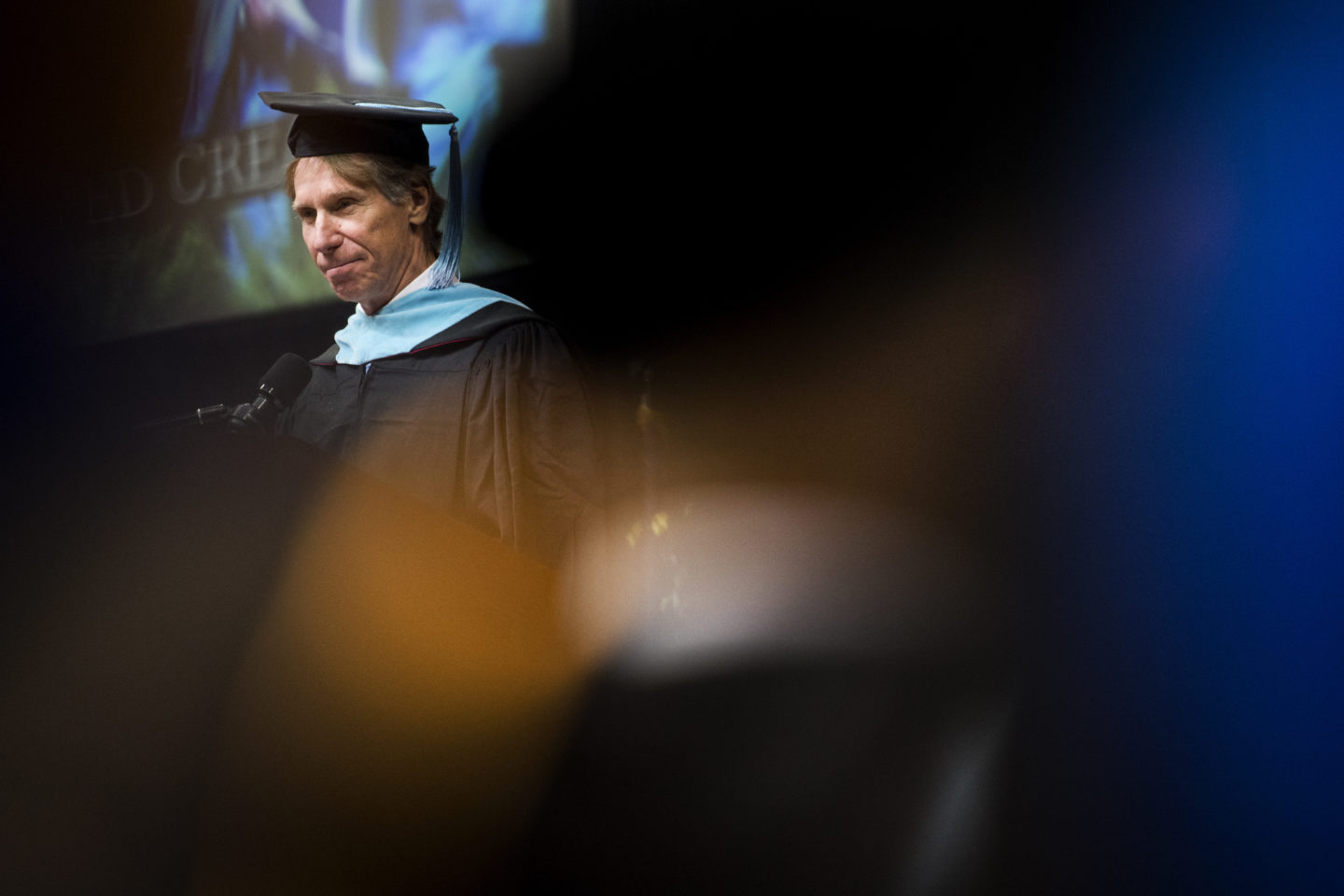
Forty years ago, Billy Starr founded the Pan-Mass Challenge, a charity bike ride across Massachusetts that raises money for cancer research. He said that a 400-mile hike on the Appalachian Trail and a 120-mile bike ride a couple of years earlier had helped him to discover what he wanted to do with his life: build a business that “serves a vast public need.”
On Friday, Starr urged graduates of the College of Professional Studies at Northeastern to find a way to nurture their own most fervent interests in life.
“Find a way somehow, utilizing all the skills and knowledge that you have acquired, to nurture that passion and maintain it as a central driving force in your life,” said Starr, who served as the graduation speaker at a ceremony for students who earned their bachelor’s and master’s degrees this year. “That pursuit does not come with guarantees. But I stand before you as a testament to its uniquely, exhilarating power on the path to success and happiness.”
Starr, who earned his master’s in education from Northeastern in 1978, traced back his job today as the executive director of the Pan-Mass Challenge to the early 1970s, when his mother, uncle, and cousin died of cancer. He also shared how the death of a rider in the fifth year of the event challenged him, recalling how he struggled to cope with the tragedy and pain that it caused the rider’s family.
But Starr said he never doubted the mission of his organization. Over the past 40 years, nearly 200,000 cyclists and volunteers have participated in Pan-Mass Challenge, and $654 million has been donated to the Dana-Farber Cancer Institute.
“Triumph and tragedy often walk hand in hand,” Starr said. “To cope efficiently, it is essential that you have a clear grasp of who you are and why you set out on a particular path.”
Starr congratulated the graduates for earning their degrees. He told them to remember that most success is born of failure, and that “all progress scrapes and claws before it glides and soars.”
“That is why having a genuine passion for your work is so vital,” he said. “It is what keeps you going in the face of the inevitable obstacles on the road ahead.”
In opening remarks, Mary Loeffelholz, dean of the College of Professional Studies, told graduates that they represent “Northeastern’s global network of learners.” She said many students had earned their degrees online and through the university’s network of campuses in Charlotte, North Carolina; Seattle; the San Francisco Bay Area; Toronto; Vancouver; and London.
“You graduate already having begun to build a national and global network of your own making,” Loeffelholz said. “You have experienced learning without boundaries.”
Loeffelholz highlighted the diversity and accomplishments of the graduating class. She asked graduates to stand and be recognized if they had studied at Northeastern’s campuses outside of Boston, had come to Northeastern from another country, have served in the military, or attended the Lowell Institute School, through which students with previous college experience finish their bachelor’s degrees in the fields of science, technology, engineering, or business.
The College of Professional Studies offers 95 undergraduate, master’s, graduate certificate, and doctoral programs, many of which are available online or through a combination of online and in-classroom learning. More than 1,600 students from 42 states and 44 countries received bachelor’s, master’s, or doctoral degrees from the College of Professional Studies this year, including over 200 students who were recognized for receiving their doctorates at a ceremony on Thursday.
Philomena Mantella, senior strategic advisor to the president at Northeastern, told the graduates that their education has positioned them well for a “lifetime of growth, discovery, and learning.”
“Learning will never cease, nor will your relationship with your university and those who comprise it,” Mantella said. “As you continue to grow, we are here to remind you that the Northeastern network will always be accessible to you.”
In addition to the graduates, Friday’s ceremony honored professor of the practice Baktybek Beshimov and assistant teaching professor David Hagen for receiving the college’s 2019 Excellence in Teaching Award.
To see more pictures from the college’s 2019 graduation, visit the photo gallery.
Tomorrow’s Ideas Today
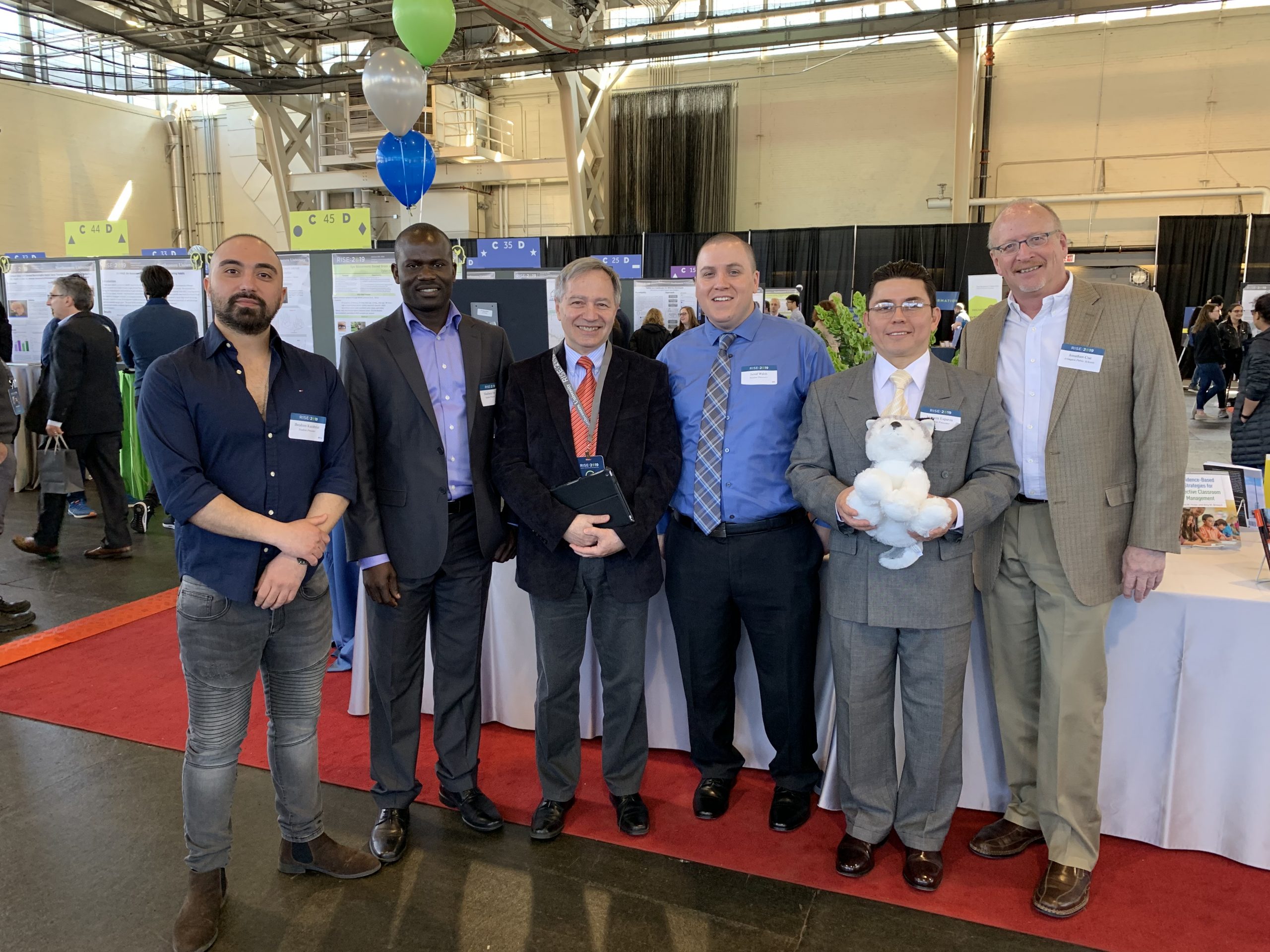
From left: Ibrahim Karabulut, Ondo Shadrack, Krassimir Marchev, Jared Walsh, Vincent Esparza, and Jonathan Cue.
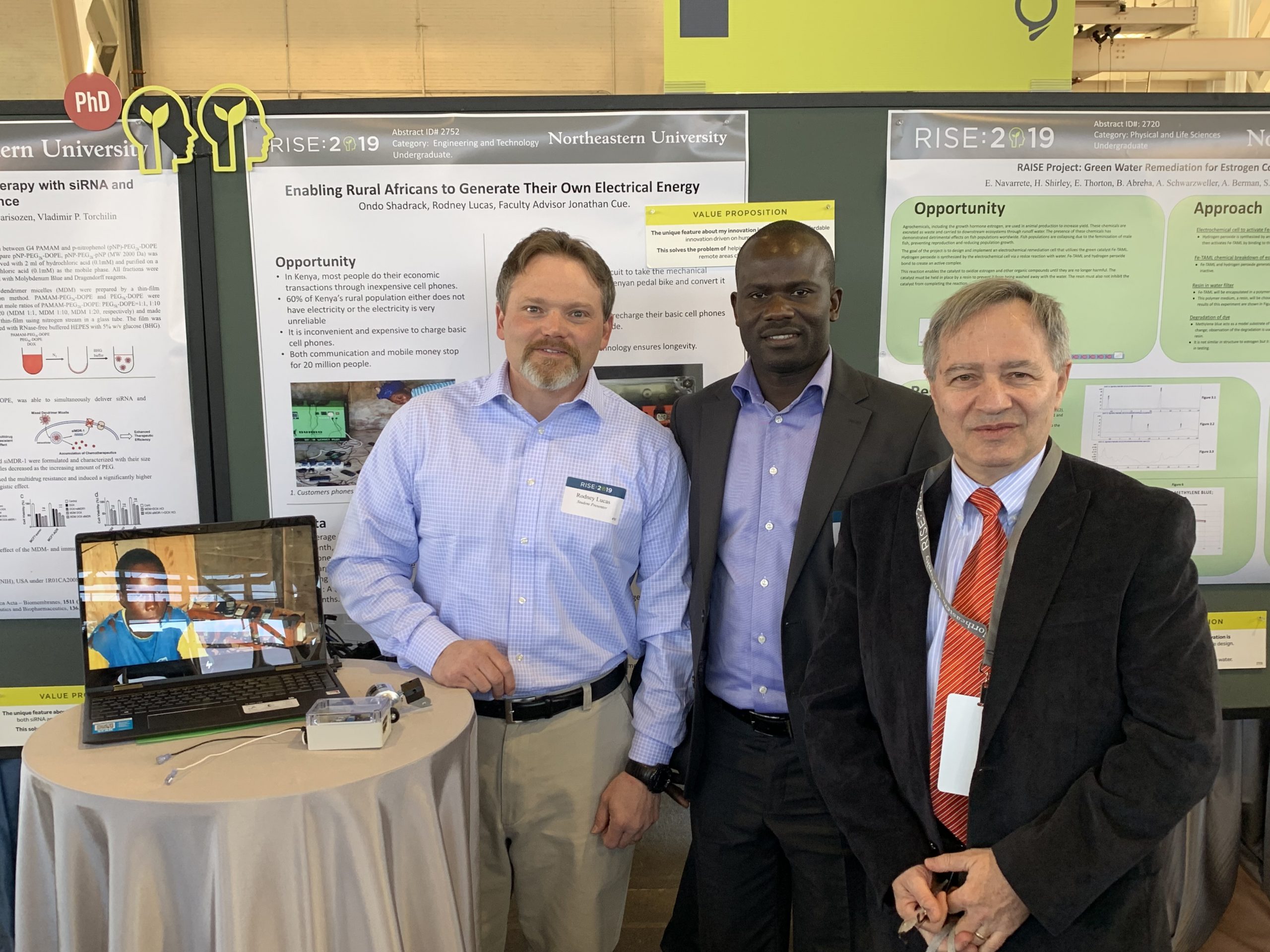
At the annual RISE event, students showcase solution-focused innovations with industry leaders, entrepreneurs, investors, researchers, and technology enthusiasts from diverse sectors. A team of five College of Professional Studies engineering technology students presented four posters, two of which had working prototypes. Jonathan Cue, the instructor teaching the engineering capstone project and the students—Jared Walsh, Vincent Esparza, Ondo Shadrack, Rodney Lucas, and Ibrahim Karabulut—presented projects ranging from gun control devices, energy utilization for mobile devices in Africa, air purification in automobiles and minimizing health risks by device optimization.
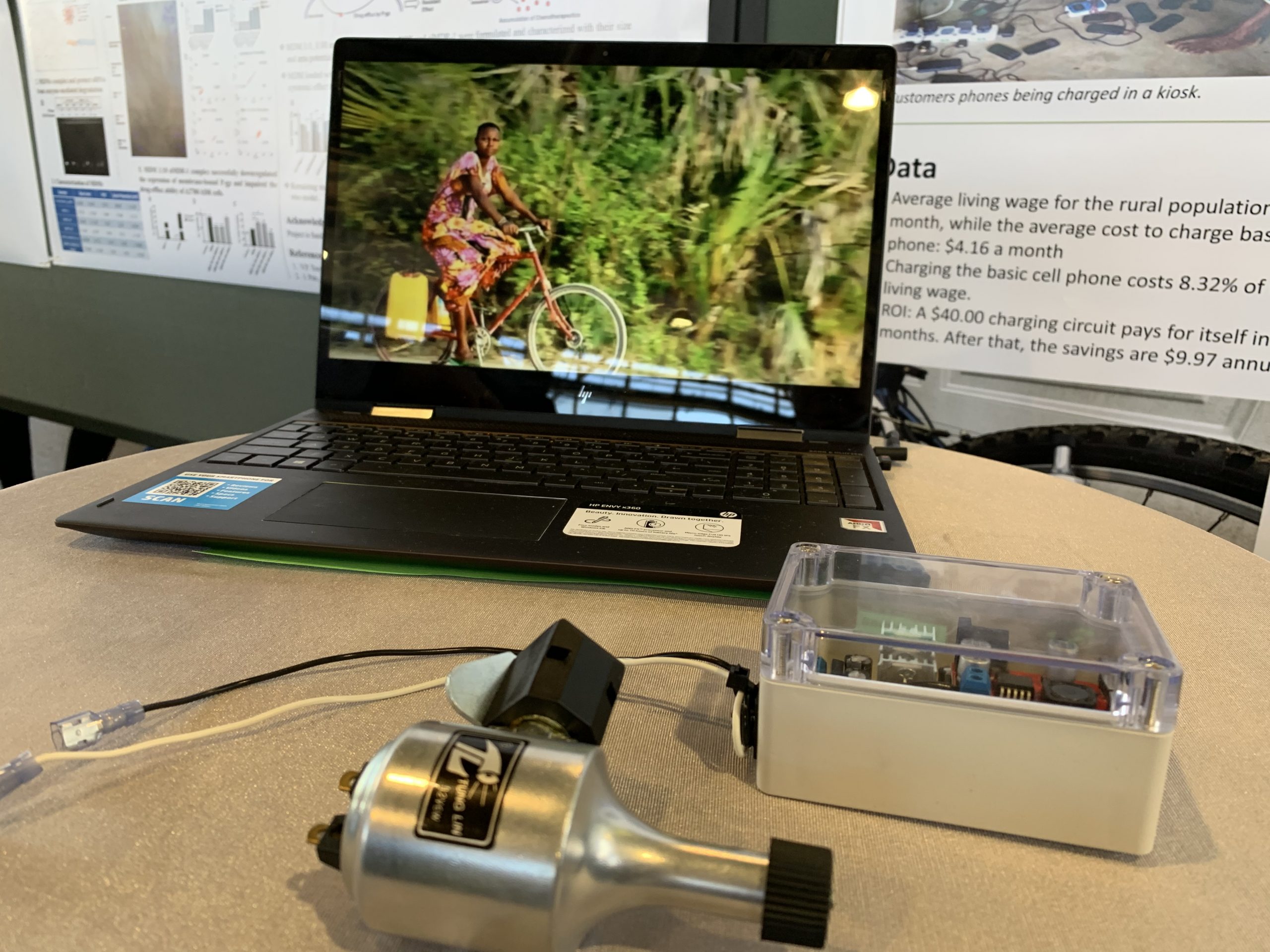
Ondo Shadrack proposed in his poster, “Enabling Rural Africans to Generate Their Own Electrical Energy,” a way to charge cellphones with bicycle lights, offering greater affordability and convenience in phone charging.
What makes high school students want to study science, technology, engineering, and math?
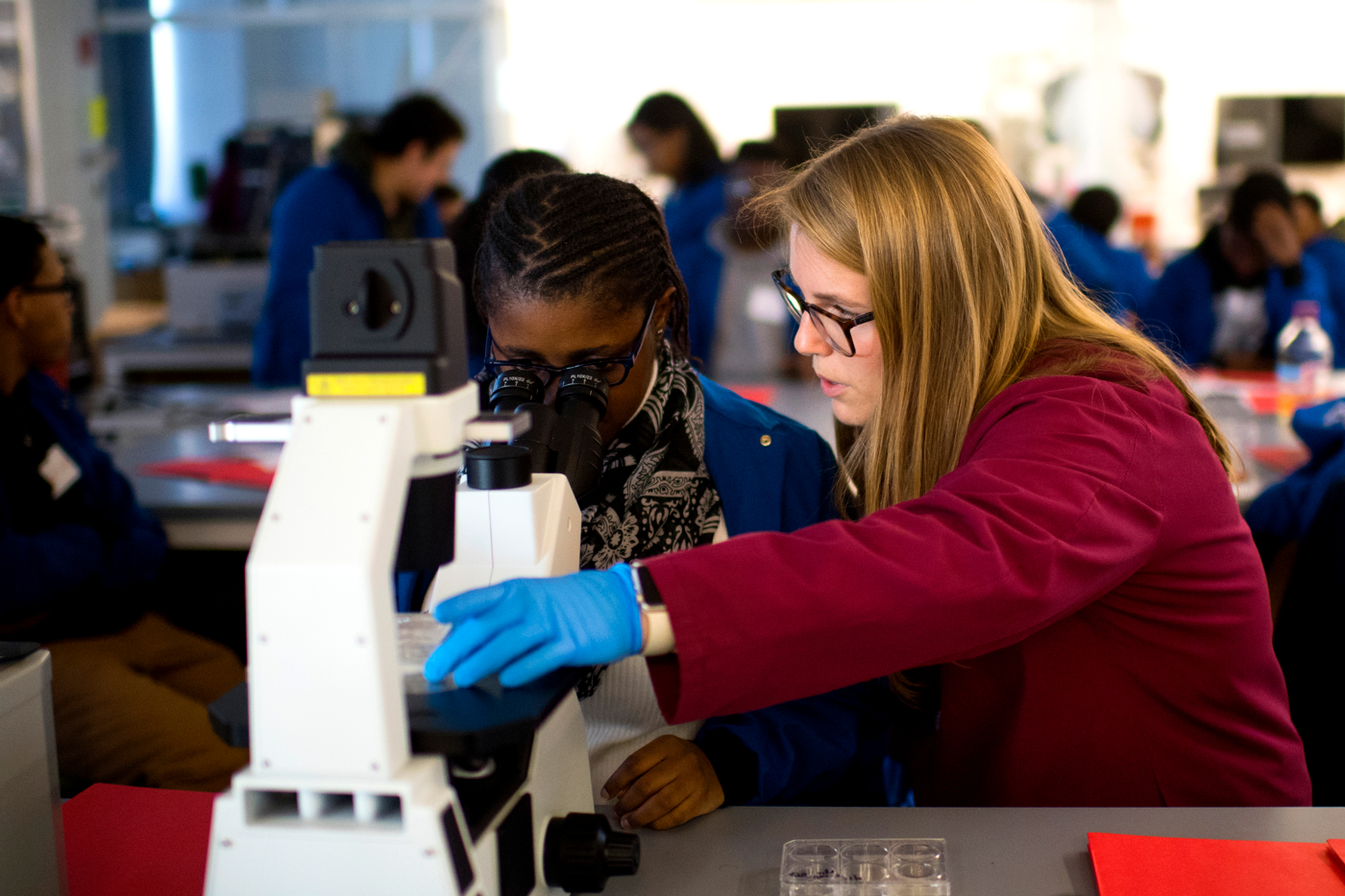
What makes high school students want to become interested in science, technology, engineering, and math? And what motivates them to pursue careers in these fields?
Three Northeastern University faculty members in the Graduate School of Education have received a grant from the National Science Foundation to answer these questions. They will focus, in particular, on women and underrepresented minorities, which are groups that are disproportionately employed in the fields known collectively as STEM.
Husky Proud
From supportive faculty, to the convenience of online classes. Find out why CPS Students are Husky Proud!
Brian LaPointe – Leadership
——–
“Being a returning student after a 10+ year gap In my academic career, it was frightening to take my first class back. I have now been back for several semesters and I am happy that all of my professors were caring and assisted in my learning curve. Getting used to the online format and working at the same time wasn’t as difficult as I had thought and having professors that care made a huge difference.”
Magdalena Kawalkowski – Project Management
——–
“I had never taken an online program until I started my journey at Northeastern University. The professors I had so far are experts in the field and extremely accommodating especially since the classes are online. So far the coursework helps my career based on the readings, professors’ knowledge, and discussion from other students. I am happy I chose Northeastern and proud to be a Husky!”
Urja Patel – Project Management
——–
“Being a part of Northeastern University has changed my life for good. I am so proud to be a husky. Northeastern has amazing professors and i would personally want to thank my academic advisor. He has been a very important part of my journey at northeastern. The help and guidance from him has turned my academic journey for good. I would also want to mention the XN projects under CPS. I believe it is an excellent program to expose the students to real work life. Thus, having so much exposure at northeastern has boosted my confidence and made me a better person. Thank you for everything. I am so proud to be a husky.”
Jacquelyn Collins – Finance and Accounting Management
——–
“Choosing Northeastern CPS to complete my Bachelor’s degree was the best decision I have made in my life so far. The flexibility of the online option has allowed me to embrace being able to work and go to school. My professors are so passionate about what they teach, which can be hard to find sometimes in online classes. I love how involved everyone is. This program has helped me in my line of work. I’ve found a lot of what I learn can be applied directly to my actual job. I’m so proud to be a part of this school, it really has changed my life. Everyone is supportive and encouraging. I can’ wait to finish my degree and maybe even go to grad school here!”
Kara Fulginiti – Global Studies and International Relations, Global Student Mobility Concentration
——–
“I am proud to be a Husky and to have the chance to pursue my educational goals online without sacrificing quality! The online Global Studies and International Relations masters program has really helped to push my career in U.S. Immigration forward. I recently obtained a position as an Immigration Specialist at the National Institutes of Health in Bethesda, MD. The NIH is the nation’s largest biomedical research institution, inviting scientists and medical doctors from around the world to the United States in order to further critical research in cancer studies and other diseases. I credit a large portion of my obtaining this new position to the skills and education I have gained through Northeastern University, which really help with my intercultural communication in my day to day work. The online format also allows me to take courses at a pace that I can manage while working full-time. I am very excited to graduate with my master’s degree in 2019 as a Northeastern Husky!”
Lisa Bolduc – Corporate & Organizational Communication – Concentration in Human Resource Management
—–
“I am proud to be a Husky! Having graduated with my undergraduate degree over ten years ago, Northeastern made the process of returning to school easy. My program is flexible with both online and on the ground classes. My favorite part of Northeastern is how welcoming and helpful the students, professors and faculty are. Everyone is eager for you to get the most out of your education. Lastly, the campus and online resources are incredibly well organized. Northeastern runs like an efficient ship, that will encourage you to never stop sailing.”
2017 CPS Graduation
Words of advice from Lindsay Levin as the College confers nearly 1,500 degrees
“In these times, it is more important than ever that we learn to be wise as well as smart. To listen to our own intuition – the still small voice inside – and choose how you will respond to whatever life brings up. What we spend our time on, how we behave towards others – the means as well as the ends. This is our agency in the world. The imprint we leave behind.”
This was the message offered to nearly 1,500 graduates at the Northeastern University College of Professional Studies ceremony by Lindsay Levin, entrepreneur, leadership expert, and Founder and Partner, Leaders’ Quest, a social enterprise organization.
Levin, whose work focuses on the transformation of companies and organizations, has created a model for learning and social change through Leaders’ Quest. She believes that leaders can be found in communities and neighborhoods, in addition to corporate offices, and that tapping into one’s own network can provide extraordinary outcomes and opportunities.
Thousands of family members and friends attended the ceremony on the Boston campus, celebrating a total of 1,491 degrees conferred— 315 Bachelor’s, 1,011 Master’s, 164 Doctoral and 1 Associate’s.
Read more about two graduates: Ryan Daley, a veteran who is looking ahead to apply his dedication and ambition to a future of politics and Fran Lee Hutton, a lifelong learner who parlayed her love of maps and her degree into a one-of-a-kind job.

Faculty Recognized for Teaching Excellence Award
During graduation, the College presented the Excellence in Teaching Award to two outstanding faculty members: Dean He and Yufeng Qian.
Nominated by students in the Doctor of Education program, Professor Qian is described by one student as “actively engaged in cultivating a dynamic online learning community, and assigns relevant coursework and discussion prompts that challenge student thinking and provide the opportunity for students to critically examine their role in the research process.” Professor He, faculty member in the Master of Science in Commerce and Economic Development program, was praised for embracing teaching as an opportunity to engage and inspire his students. One student noted: “”Professor He enhanced my confidence on a career choice. He is a teacher I respect and will keep in touch with after graduation.”
Doctoral Candidates Earn Symbol of Academic Achievement
On May 11, the College hosted a Doctoral Hooding Ceremony for candidates in the Doctor of Education, Doctor of Law and Policy, and Doctor of Physical Therapy programs symbolizing their transition from student to scholar-practitioner. Candidates received their doctoral hoods from their thesis advisers at this annual ceremony.
At every doctoral hooding ceremony, one student is selected to receive the Dean’s Medal for Outstanding Doctoral Work, the highest honor awarded by the College to a doctoral graduate. The award was established to acknowledge exemplary academic achievement and to recognize demonstrated creativity and writing quality.
This year, the Dean’s Medal winner was Dr. Ted Johnson, of the Doctor of Law and Policy program, for his thesis, “Beyond the Veil: The Electoral Uniformity and Political Heterogeneity of African American Voters.” Dr. Johnson, who is a National Security Research Manager at Deloitte’s Center for Government Insights and an Eric and Wendy Schmidt Fellow at New America, noted in his speech that he went into his doctoral studies not believing the literature reviews he conducted.
“So, I did what scholars do – I questioned it. I challenged assumptions and tackled the open questions. And I set out to create myself into the man I wanted to be: A scholar. A professor. An author. And a public intellectual on black American politics,” he said.
“The College of Professional Studies made this possible,” he went on to note. “It showed me that the reason I didn’t believe the literature reviews wasn’t because the findings were wrong – but because they were incomplete. The assembly of knowledge about any given topic – to include who you are and who you aspire to be – is never complete. Adding to the body of knowledge is our charge as doctors and a duty we each owe to ourselves.”
Dr. Chris Unger, Associate Professor in the Graduate School of Education, was the faculty speaker at the ceremony.
“Your work has just begun,” Unger stated to all the graduates before him. “And hopefully you are graduating not only with the brain of a scarecrow…but the heart of a tinman…and, importantly, the courage of a lion. I harken back to these three gifts from the movie the Wizard of Oz because I see each of these as important to your future, as both change agents and as ambassadors of Northeastern.”
“I hope we have told you to follow your passion,” Unger said in his closing remarks. “Amidst the hard work and the challenges, don’t forget from time-to-time to reflect on what it is that you care about, what drives you, and your passion. Don’t forget that. And then use your brain, your heart, and your courage to make that difference.”
About Northeastern University College of Professional Studies
The College of Professional Studies is one of nine colleges of Northeastern University, a nationally ranked private research university in Boston, MA. Founded in 1960, the College teaches undergraduate, master’s, and doctoral students on campus and online in more than 65 degree programs and is part of The Professional Advancement Network.
About the Professional Advancement Network
The Northeastern University Professional Advancement Network helps professionals participate in dynamic, experiential learning opportunities, earn degrees and certificates, build connections, and keep pace with the rapidly evolving business world—now and in the years to come. This is achieved through real-world experiences and rigorous curriculums, a supportive learning environment, and comprehensive academic and career coaching—all powered by an extensive network of alumni and employer partners. The Professional Advancement Network is an innovative approach to lifelong learning, offering access to over 200 distinctive, high-quality educational programs, degrees, certificates, and boot camps.
College of Professional Studies 2016 Graduation
“Let Your Imagination Set Your Limit”
Words of Advice from Retired Army General David D. McKiernan as Northeastern University College of Professional Studies Confers More than 1,000 Degrees
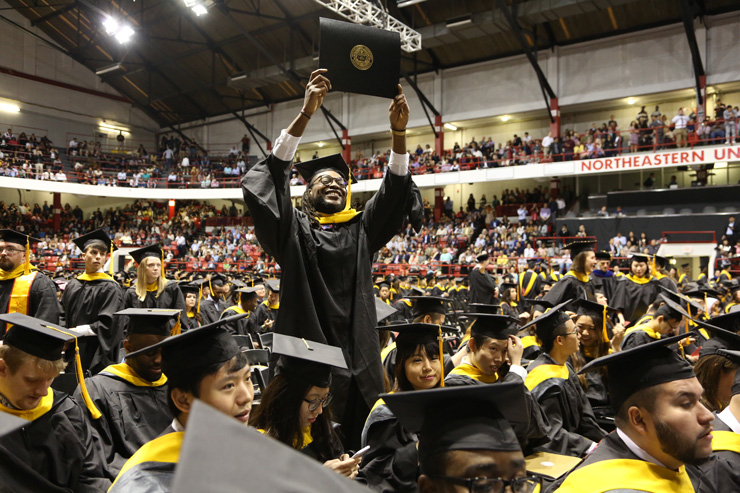
“When you walk out that door today, the future is in your hands, and your minds…. there’s no magic key to happiness and success. That requires competency, commitment, courage and lifelong development. “
That was the guidance offered this morning to more than 1,000 graduates at Matthews Arena on Northeastern’s Boston campus by graduation speaker Retired Army General David D. McKiernan, the former top commander of U.S. and NATO forces in Afghanistan.
Thousands of family members and friends were in attendance, celebrating a total of 1,016 degrees conferred— 6 Associate, 212 Bachelor’s, 670 Master’s, 7 Certificate of Advanced Graduate Studies, and 121 Doctoral.
McKiernan, who once led U.S. forces in Iraq and Afghanistan and who was in charge of joint forces from NATO and 42 contributing countries, retired from the Army in 2009. He has served as a special advisor to senior leaders of Northeastern on the expansion of the university’s programs for veterans and active duty military. McKiernan’s speech comes at a time when the number of degrees conferred to veterans in the first half of 2016 has grown 46% compared to the same time period in 2011. Today, 38 veterans graduated – 17 undergraduates and 21 at the graduate level.
McKiernan had five pieces of advice for graduates. “Think of it as advice from someone who has been around the global block and experienced the good, the bad and the ugly,” he said.
- Be a creative thinker.
- Don’t shy away from getting outside your comfort zone.
- If you want to be a leader, it is all about interpersonal skills.
- Demonstrate the notion of empathy. “As we say in the Army, ‘The view is different depending on what hill you’re standing on,’” he added.
- Be of service to America or the country you’re a citizen of, through professional, volunteer or charitable venues. Think about ways you can serve people.
Faculty Presented with Teaching Excellence Award
During graduation, the College presented the Teaching Excellence Award to two outstanding faculty members: Darin Detwiler and Corliss Brown Thompson.
Nominated by students in the Master’s in Regulatory Affairs of Food and Food Industries program, Detwiler’s students called him an “outstanding and engaging” instructor who shares an enormous passion for his discipline, which he instills in others. While the students nominating Dr. Brown Thompson, faculty member in the Graduate School of Education, point to her excellence as a “scholar, teacher and guide,” and note her ability to help them realize meaningful and impactful community engagement strategies in their work.
Students Receive Degree of the Highest Honor: Their Doctorate
On May 12, the College hosted a Doctoral Hooding Ceremony for candidates in the Doctor of Education, Doctor of Law and Policy, and Doctor of Physical Therapy programs symbolizing their transition from student to scholar-practitioner. Candidates received their doctoral hoods from their thesis advisers at this annual ceremony.
At every doctoral hooding ceremony, one student is selected to receive the Dean’s Medal for Outstanding Doctoral Work, the highest honor awarded by the College to a doctoral graduate. The award was established to acknowledge exemplary academic achievement and to recognize demonstrated creativity.
This year, the Dean’s Medal winner was Dr. Hunter Hustus, in the Doctor of Law and Policy program, for his thesis titled “Nuclear Arsenals at Low Numbers: When Less is Different.” Hustus, who completed his Master’s degree 20 years ago and spent 20 years in the Air Force, noted in his speech how the doctoral program allowed him to rethink what he already knew, develop new perspectives and how the diversity and support within his cohort contributed to his education. “It was an ambitious project,” Hustus remarked. “While many of the results were unexpected, the biggest surprise was in how much I enjoyed doing the research.”
Dr. Cordula Robinson, an Associate Professor in the Master’s in Geographic Information Technology program, was the faculty speaker at the ceremony. Robinson noted in her speech how her PhD marked the beginning of a life-long adventure for her: she lived and worked in three countries, studied Viking data from the planet Mars, worked on the Magellan mission to Venus, had an asteroid named after her and worked with indigenous people in North Africa and the Middle East on the issue of water scarcity, among many other things. Her advice to the doctoral graduates before her?
“My PhD truly marked the beginning of this life-long adventure and way of living and so it may be for you. It may not always be easy, and will require perseverance and patience, but it can always be interesting. Continue to represent your experience to your best ability while retaining the panoramic view. To put in motion what your PhD inspired, to integrate your wisdom with practice, and to set forth to be the world’s next senior managers and policy makers, advanced clinicians in a dynamic healthcare system, or prepare for executive leadership and curriculum design. To be trailblazers, innovators, and future leaders.”
Grant Pushes Fundraising for the Lowell Institute School
Most Successful Fundraising Initiative To Date
The re-imagination of the Lowell Institute School at Northeastern University into a dedicated school for transfer and returning students has earned more than $10 million in grant support in the past year, making this fundraising initiative the largest and most successful in the history of Northeastern University College of Professional Studies.
The most recent award of a $350,000 grant from Amelia Peabody Charitable Fund for the building and equipping of a Thermo Fluids Lab brings the total of grants and gifts to support the school to more than $10 million.
The Lowell Institute School at Northeastern University is designed for bachelor’s degree students seeking to complete degrees in some of the fastest growing sectors of the economy – the sciences, technology and engineering, frequently called “STEM” for the subjects of science, technology, engineering and math.
Grants and gifts supporting the Lowell Institute School include:
- $4 million from the Lowell Institute for programmatic and curricular design, faculty, specialized advising services and student scholarships.
- $3.9 million grant from the U.S. Department of Education First-In-the-World grant program to study and develop ways to improve persistence and outcomes among students under-represented in STEM fields
- $1 million from the Ruby W. and LaVon P. Linn Foundation for scholarships for returning veterans to attend the Lowell Institute School
- $500,000 from the National Science Foundation Business-Higher Education Forum and the Massachusetts Competitive Partnership to create pathways for students to attain undergraduate degrees and secure high-demand jobs
- $390,000 in gifts from individuals
- $350,000 from the Amelia Peabody Charitable Fund
“The Lowell Institute School is being transformed to meet the demands of both students who know the value of completing a STEM bachelor’s degree, and the employers who are hungry to hire them,” said John G. LaBrie, dean, Northeastern University College of the Professional Studies. “It is a powerful vote of confidence that organizations ranging from the Lowell Institute to the U.S. Department of Education, to foundations and individuals have stepped forward to support the school. It tells us that we are answering a powerful need both in higher education and the innovation economy, and in so doing, we’re creating an opportunity to make a lasting and meaningful change in the lives of students.”
The Lowell Institute School was founded by the Lowell Institute, one of the longest-standing educational foundations in the country, founded in 1836.